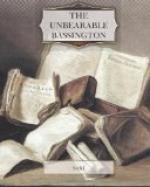“Doesn’t it make you conceited, Courtenay,” she asked, “to look at all those foreign newspapers hanging there and know that most of them have got paragraphs and articles about your Persian speech?”
Youghal laughed.
“There’s always a chastening corrective in the thought that some of them may have printed your portrait. When once you’ve seen your features hurriedly reproduced in the Matin, for instance, you feel you would like to be a veiled Turkish woman for the rest of your life.”
And Youghal gazed long and lovingly at his reflection in the nearest mirror, as an antidote against possible incitements to humility in the portrait gallery of fame.
Elaine felt a certain soothed satisfaction in the fact that this young man, whose knowledge of the Middle East was an embarrassment to Ministers at question time and in debate, was showing himself equally well-informed on the subject of her culinary likes and dislikes. If Suzette could have been forced to attend as a witness at a neighbouring table she would have felt even happier.
“Did the head waiter ask if we were engaged?” asked Elaine, when Courtenay had settled the bill, and she had finished collecting her sunshade and gloves and other impedimenta from the hands of obsequious attendants.
“Yes,” said Youghal, “and he seemed quite crestfallen when I had to say ‘no.’”
“It would be horrid to disappoint him when he’s looked after us so charmingly,” said Elaine; “tell him that we are.”
CHAPTER X
The Rutland Galleries were crowded, especially in the neighbourhood of the tea-buffet, by a fashionable throng of art-patrons which had gathered to inspect Mervyn Quentock’s collection of Society portraits. Quentock was a young artist whose abilities were just receiving due recognition from the critics; that the recognition was not overdue he owed largely to his perception of the fact that if one hides one’s talent under a bushel one must be careful to point out to everyone the exact bushel under which it is hidden. There are two manners of receiving recognition: one is to be discovered so long after one’s death that one’s grandchildren have to write to the papers to establish their relationship; the other is to be discovered, like the infant Moses, at the very outset of one’s career. Mervyn Quentock had chosen the latter and happier manner. In an age when many aspiring young men strive to advertise their wares by imparting to them a freakish imbecility, Quentock turned out work that was characterised by a pleasing delicate restraint, but he contrived to herald his output with a certain fanfare of personal eccentricity, thereby compelling an attention which might otherwise have strayed past his studio. In appearance he was the ordinary cleanly young Englishman, except, perhaps, that his eyes rather suggested a library edition of the Arabian Nights; his clothes




